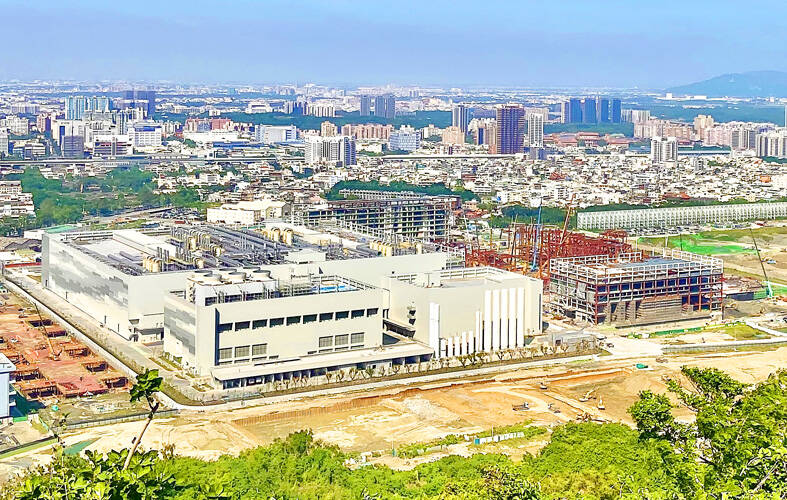The two facilities — P4 and P5 — are part of TSMC’s production expansion program, which aims to build five fabs in Kaohsiung.
TSMC facility division vice president Arthur Chuang (莊子壽) on Thursday said that the five facilities are expected to create 8,000 jobs.

Taiwan Semiconductor Manufacturing Co’s 2-nanometer fab in Kaohsiung
To respond to the fast-changing global semiconductor industry and escalating international competition, TSMC said it has to keep growing by expanding its production footprints.
The P4 and P5 fabs would be located next to the third fab, P3, and their construction is scheduled to be completed in 2027.
TSMC completely abides by the law and the construction plan is proceeding as scheduled, Chuang said, speaking with residents of Kaohsiung who are concerned about the environmental impact of the fab construction.
TSCM said its first fab in Kaohsiung, P1, which has started equipment installation, is scheduled to start mass commercial production of the advanced 2-nanometer process next year. The 2-nanometer process would become TSMC’s latest technology to begin mass production after launching commercial production of the 3-nanometer process at the end of 2022.
The 2-nanometer process would be 10 percent to 15 percent faster than N3E, an enhanced version of the 3-nanometer process, and consume less power. Densities would also be higher by more than 15 percent.
Construction of the second fab, P2, is set to be completed next year. It would also use the 2-nanometer process, while construction of the third fab is expected to be completed in 2026. That fab is to use the 2-nanometer process or more sophisticated technologies.
TSMC did not disclose what process the 4th and 5th fabs would use.
At an investor conference in mid-October, TSMC chairman C.C. Wei (魏哲家) said the company’s clients appeared more interested in its 2-nanometer process than the 3-nanometer process, so the company is preparing more 2-nanometer production capacity to meet demand.
TSMC already has a 2nm wafer plant in Baoshan in Hsinchu County, where a trial run has begun. Mass production at that facility is expected to begin next year.
The chipmaker is also developing A16 process mass production, which is scheduled for the first half of 2026. The company describes it as a next-generation nanosheet-based technology featuring Super Power Rail, “an innovative, best-in-class backside power delivery solution” that “improves logic density and performance by dedicating front-side routing resource to signals.”
Investor Conference
TSMC is scheduled to host an investor conference on Jan. 16, which will be closely watched for its market outlook and the potential impact of US tariff policies, Taiwan Institute of Economic Research (TIER, 台灣經濟研究院) researcher Arisa Liu (劉佩真) said.
Taiwan's semiconductor industry is likely to exceed NT$6 trillion (US$186 billion) in output by the end of next year, growing 16.5 percent year-on-year, with TSMC anticipated to outpace the average with a 20 percent increase, Liu said.
She said that artificial intelligence (AI) will continue to drive the growth of the semiconductor sector, with TSMC being the leading foundry for AI chips and benefiting significantly from rising demand.
Liu noted that TSMC's growth will be fueled by orders for NVIDIA's B200 and B300 chips, as well as demand for application-specific integrated circuits (ASIC) and AI processors for smartphones and computers.
In addition, the rising demand for 3nm and 5nm chips in AI applications will be key factors propelling TSMC's expansion in the coming year, Liu said.
Market focus is also on the potential impact of tariff policies proposed by US president-elect Donald Trump, who is set to take office on Jan. 20, she said.
Liu pointed out that TSMC may not face direct tariffs, as its chips are not directly exported to the US, but instead sent to system assembly manufacturers.
However, any increase in import duties on US-bound goods could raise prices, potentially affecting both the US and global economies, with indirect impacts on TSMC, she said.
Taipei Time
